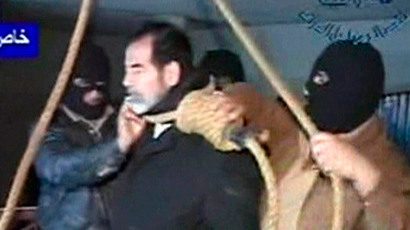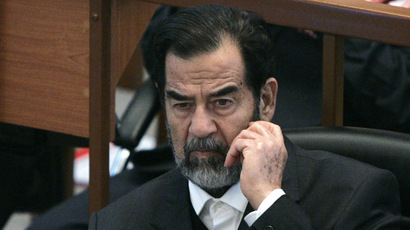Trial of Saddam Hussein was victor’s justice’ – Ex-tribunal judge to RT
The former chief judge that presided over Saddam Hussein’s trial told RT in an exclusive interview how the tribunal, which was dependent on the US, lacking in legitimacy, and overshadowed by the killing of lawyers, sentenced the Iraqi strongman to death.
In November of 2006, Saddam Hussein was sentenced to death by hanging three years after a US-led “coalition of the willing” invaded Iraq, removing him from power as the country’s leader. The hanging itself was carried out at the US’ Camp Justice military base – an act that has been criticized by a number of governments and described by rights groups as cruel and unfair.
The tribunal leading to the death sentence was also regarded by many as a “political show” and “vengeful action,” with international law experts questioning its legitimacy and fairness.
Former Chief Judge Rizgar Amin, who oversaw the trial of Hussein and seven former members of his government, shared details regarding the notorious trial with RT. Amin, the only judge whose name was made public at the trial’s opening in October of 2005, resigned in January of 2006 following pressure from the government to speed up the proceedings, according to Reuters.
“The trial was, to a larger extent, of a political nature. Ruling circles as well as various political forces had impact on it,” he said.
Amin pointed out that the Iraq Special Tribunal (IST), which conducted the trial, had been created in 2003 by the Coalition Provisional Authority (CPA), a body set up by the occupying forces to administer the country following the US invasion.
The CPA operated on Iraqi soil as a Pentagon division. It had executive, legislative, and judicial authority in the defeated country, and the Authority’s head, Lewis Paul Bremer, was the de-facto governor of Iraq until mid-2004. His first decrees disbanded the Iraqi army and ruling Ba’ath party, and created an Iraqi Governing Council. Its members were handpicked by Bremer from groups and persons that welcomed the 2003 invasion.
“The United States’ role has been instrumental to create and finance the trial,” Amin added. “They also provided it with everything necessary to operate. Even trial-related expenses have been adopted by Iraqi Governing Council.”
World would be a better place with Saddam, Gaddafi still in power – Trump on.rt.com/6uo1
Dependence on the US-led occupation authority wasn’t the only factor influencing the trial’s impartiality and fairness. “To my utmost regret, I must admit that the trial of Saddam Hussein had been victor’s justice, rather than manifestation of principles it used to serve. A thirst for revenge dominated the hearings.”
Apart from the spirit of the trial, the competence of the judges and the statutes authorizing the tribunal have been called into question by international observers. Human Rights Watch said in 2003 that the law did not require the tribunal’s judges and prosecutors to have experience in complex criminal cases, such as that of Saddam Hussein, nor did it require that guilt be proven beyond a reasonable doubt, which is regarded a cornerstone of any criminal trial.
The ability of the defense counsel to vigorously represent their clients without fear of reprisal or retaliation, another key issue for any fair trial, was also missing. “In theory, according to a law on court proceedings, lawyers’ rights have to be ensured, but unfortunately, it was not the case in reality,” Amin said.
“As we know, [Saddam Hussein’s] chief lawyer was abducted and killed after the first hearing. Other lawyers have been intimidated or even murdered. The lawyers’ security was inadequate which made fairness of the court’s judgments doubtful.”
On June 21, 2006, Khamis al-Obeidi, Saddam Hussein’s defense counsel, was abducted from his home in Baghdad and shot dead. Lawyers representing other defendants were either abducted, found dead, or forced to flee the country for their lives.
Despite the entire trial falling into disarray, the judges sentenced Saddam to death by hanging on November 5, 2006. As Chief Judge Ra’uf Abdel Rahman, who had replaced Judge Amin, read the verdict aloud, a defiant Saddam shouted, “Long live the people! Long live the Arab nation! Down with the spies!”
According to media reports, he was executed by hanging on December 30, 2006 at approximately 6 am local time at Camp Justice, a US military base in the northern part of Baghdad. Even the execution time violated the law. “Pursuant to Article 290 of Iraq’s Criminal Procedure Code, death penalty cannot be carried out on official holidays, as well as holidays relating to religion of an indicted person,” Judge Amin said.
Saddam was executed on the first day of an important Sunni Islamic holiday, Eid ul-Adha, “obviously a breach of the above article,” Amin added, and “a mandatory 30-day period between final verdict and execution – set out in Article 27 of the Code – was not respected".
https://www.rt.com/news/339076-saddam-trial-victors-justice/




0 Comments:
Post a Comment
Subscribe to Post Comments [Atom]
<< Home